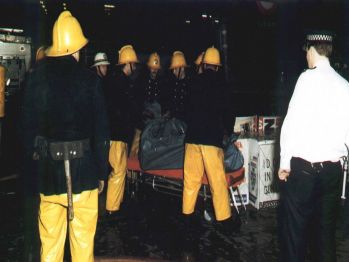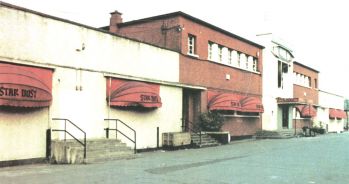 In 2006 there were 436,000 fires in the UK, costing 504 lives. Most of these fires could have been avoided by taking simple measures and whether you are at home or in the workplace you should always consider what we are going to discuss.
To begin I would like to look at some case studies, a number of these you may recognise:
Imagine It's 1987 and you are on your way home in London, as you go down the escalator at Kings Cross underground station you notice a small amount of smoke. What do you think you would do in this situation? Would you be the first to raise the alarm?
What actually happened was that everyone walked past, trying to avoid inhaling the smoke and just getting on with their day. They probably assumed that someone else would raise the alarm. After a while the fire started to grow and eventually a ticket officer noticed and reported it. By the time London Fire Brigade were in attendance the fire had engulfed the entire ticket hall. By the time this fire was extinguished 31 people had been killed (1 of which was the first station officer from the fire brigade to attend; he was killed whilst trying to rescue a woman from the smoke filled ticket hall).

Now you're in Belfast at a venue called Stardust Nightclub, 500 revellers are in the packed building. A fire starts in the foam of a ripped seat and again no one reports its. Over 50 people die, more than 200 are injured. When do people decide that they are going to leave? Usually when their eyes start to hurt from the smoke, they can feel the heat of the fire or they start coughing. This is when it has become too late.

The most important learning point here is the issue of human behaviour, in both these incidents none of the public reacted in the way that you would imagine. People just stood and watched the fire or just carried on with what they were doing. This is natural human behaviour when there is a fire, or indeed any emergency situation. Have you ever been sitting in traffic when there was an accident on the other side of the road and the queue you're sitting in is caused by people slowing down to look at the accident, again this is human behaviour. My advice is always get out and raise the alarm.
Let's bring this closer to home. You're lying in your bed at night, fast asleep. About 3am you are awakened by your smoke alarm going off (you are obviously very safety conscious as you have a working smoke alarm). What do you do now? This is the point where your next decision could be your last.
Now you have seen what really can happen let's look at what you can do to protect yourself, your family and your business.
In the previous case you had got to the crucial point where something has gone wrong and you need to make the right decision. The fact that the smoke alarm is going off should immediately be telling you that something is wrong EVEN IF YOU CANT SMELL ANY SMOKE OR SEE ANY FIRE. It is very common for you to want to go and investigate, yes your right it could be nothing or it could be some over heated food, however if it had been a fire you could have just made the most fatal mistake. Whilst your off investigating your family could all be in bed unaware, as soon as you opened the door to the room where the fire is you could release the fire, given it the oxygen it was waiting for and allowing the smoke and flame to block off the exit which your family would have been in need of (i.e. the stairs). What I am trying to say in simple terms is always GET OUT GET THE FIRE BRIGADE OUT AND STAY OUT.
What if you're trapped in your room? My advice here is always to make sure you charge your mobile in your room at night, you can then call 999 from your room and tell the operator where you are trapped. Don't try making a run for it through the smoke, if your unable to breath in the atmosphere then you need to keep the door shut, put a towel at the bottom of the door and keep near an open window. If you're able to get further away from the fire then even better (i.e. an en suite or adjoining room), the more closed door you have between you and the fire the better.
Smoke Alarms
With all the press about smoke alarms you should know by now that you should have at least one in your home (preferably one on each landing). Most fire brigades now offer home safety visits in which they will fit and supply smoke alarms for free. If your fitting your own there are certain rules you should apply:
* Avoid putting these near to kitchens or bathrooms (fumes form cooking or steam from the shower can set them off)
* As a minimum it is recommended that you have 1 alarm on each floor (usually on the landing)
* Located on the ceiling NOT on walls, this will allow the alarm to activate at the earliest point.
* Alarms should be near or at the middle of the room and at least 30cm from a wall.
* Test your alarm once a week by pushing the test button
* Change the battery once a year (unless it is a ten year alarm)
* Use a vacuum cleaner nozzle to clean out any dust from inside the alarm by removing the cover.
Evening routines
To protect yourself and your family it is important that you make the house as safe as possible at night as this is when you are most vulnerable and statistically when most people die in fires. Follow these simple rules:
* Shut all doors (each door will protect you for approx 20 min from a fire, and don't worry the smoke alarm will still sound. Especially focus on shutting the kitchen and bedroom doors)
* Speak to your family and arrange a fire plan (decide what you are all going to do if there is a fire, a good plan would be to meet in a particular room and leave the property together, don't ever go back in. If your trapped then stay in a safe room and call the brigade from there, keeping a window open and staying near the window)
* Don't put on dishwashers or washing machines then go to bed
* Keep window keys accessible and make sure everyone knows where they are
* Make sure any open fire is out before going to bed
What about businesses?
Fire Safety at Work.
Fire Safety laws have changed drastically in the last 2 years, putting more emphasis on the employer ensuring that they comply with the regulations. All fire safety at work starts with a fire risk assessment, for details of what is included in these follow the link below:
http://www.rbhealthandsafety.co.uk/fr_assessment.html
Most companies instruct consultants to carry these out, if you are going to do this my only advice is to check the credentials of the consultants, ensure that your assessor is a full member of the IFE (MIFE), this ensure that they are meeting a recognised standard of fire engineering. I have come across a number of consultants who are not fully aware of what is involved in the new fire safety order and therefore are preparing assessments which do not meet the needs of the enforcing authority.
Training
Ensure that your staff is trained in fire safety at work and the procedures to be adopted in your workplace. Some organisations carry this out with their in house trainers however there is a good argument for involving external training providers, especially for staff which have specific roles such as fire wardens, for more information the see:
http://www.rbhealthandsafety.co.uk/firemarshal.html
Finally
That's it for this month; I hope you have found the article interesting, if you would like to discuss any if the issues in more detail please do not hesitate to contact me. Next month I intend to look at fire extinguishers, where to place them, and what type to use and how to use them correctly. If anyone has any topics which they feel would be of particular interest please let me know.
Richard Beale
RB Health and Safety Solutions Ltd
Tel: 0845 2571489
[email protected]
Web: www.rbhealthandsafety.co.uk
"Richard Beale plays the lead role in one of the UK's leading health and safety training and consultancy services working with companies throughout the UK and abroad. His enthusiasm for his subject, along with many years experience in the industry has earned him the right to speak on this important subject. Each month, Richard will be sharing with us principles fundamentals and concepts that can keep us safe at home and in the workplace." |
